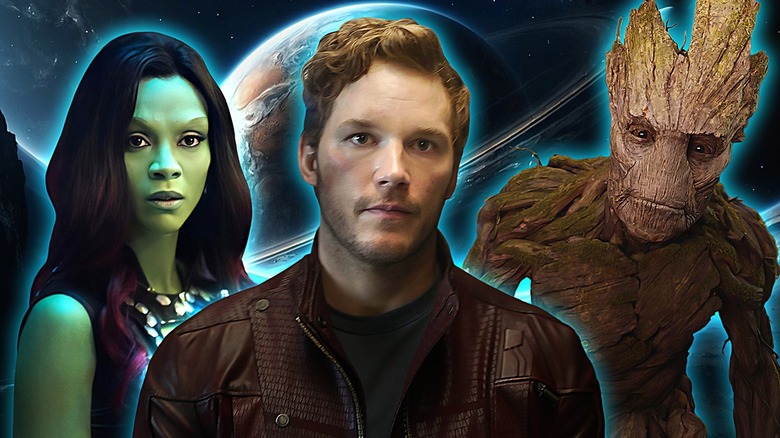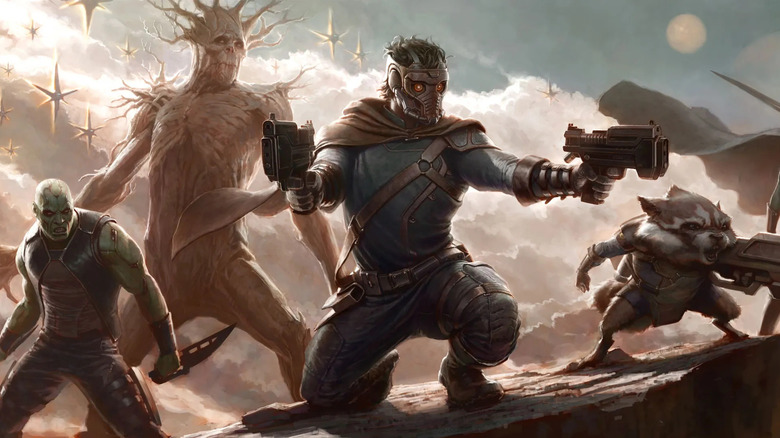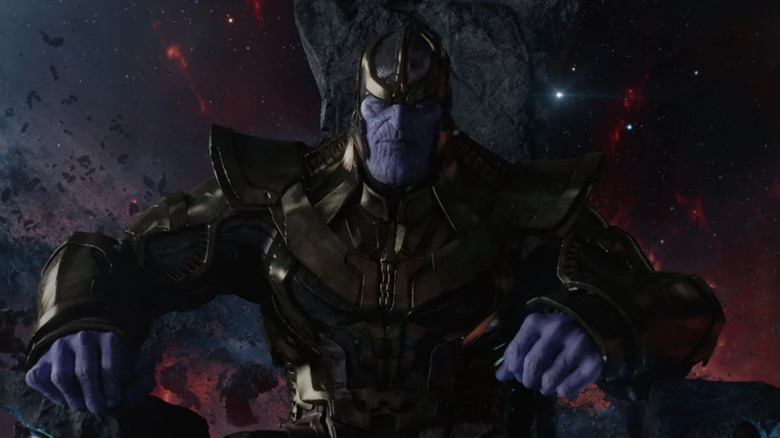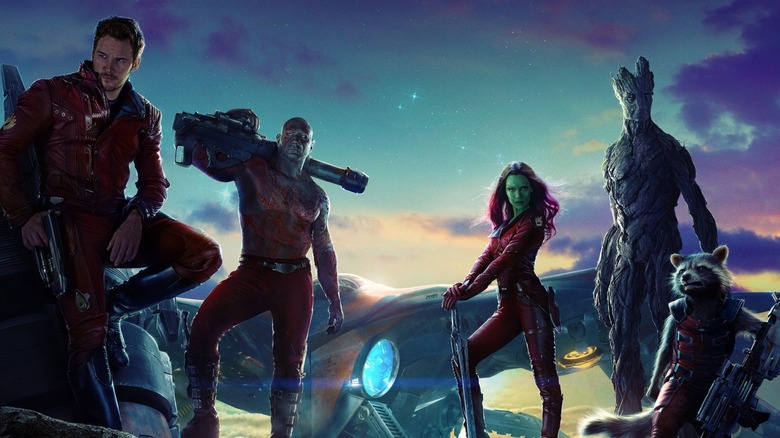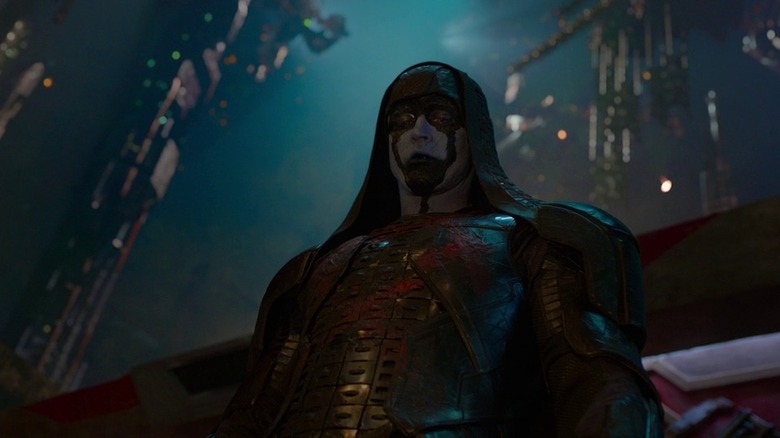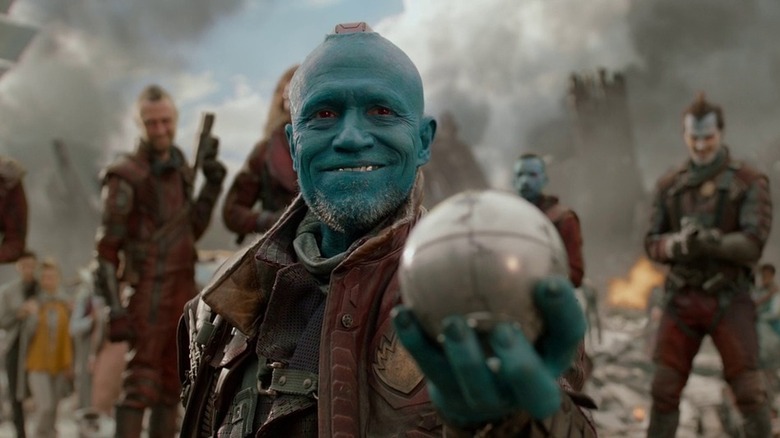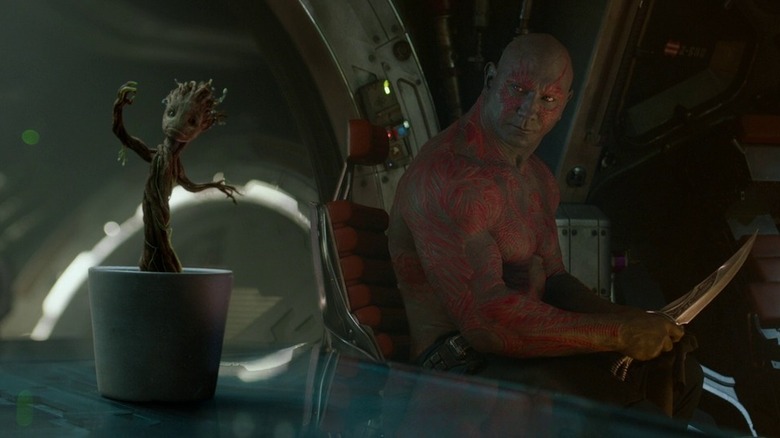10 Years Ago, Guardians Of The Galaxy Became Marvel's Most Unlikely Box Office Smash
(Welcome to Tales from the Box Office, our column that examines box office miracles, disasters, and everything in between, as well as what we can learn from them.)
"They just said, 'Take a whack at it and see what you think,'" writer Nicole Perlman explained to Marvel.com in 2014, explaining how the feature film version of "Guardians of the Galaxy" began. Perlman is one of the credited writers on the film. As part of the Marvel Studios writing program, she got to choose from a list of characters that the studio was interested in developing into films in the future. She landed on a rather unconventional choice. "I remember some of my friends were surprised that I had chosen that particular comic, because nobody had heard of it and it was so out there."
Indeed, in 2009 when Perlman first began working on the script, nobody had heard of the "Guardians of the Galaxy" outside of very hardcore comic book fans. Even quite a few regular comic readers would've probably said something along the lines of "Who?" if you were to mention the title. Yet, Perlman's decision to tackle a cinematic adaptation of this unknown, rag-tag group of heroes paved the way for a wildly unlikely multi-billion-dollar superhero franchise. Even if, in the end, Perlman had to fight tooth and nail to get the credit she deserved.
In this week's Tales from the Box Office, we're looking back at director James Gunn's "Guardians of the Galaxy" in honor of its 10th anniversary. We'll go over how the film came to be, how Gunn went from relatively small-time director to a blockbuster maestro, what happened when the movie hit theaters, how it changed the course of the Marvel Cinematic Universe, and what lessons we can learn from it a decade removed. Let's dig in, shall we?
The movie: Guardians of the Galaxy
Come the summer of 2012, Marvel Studio was riding high. "The Avengers" concluded Phase 1 of the MCU with a bang, bringing in more than $1.5 billion at the box office. There was no longer a need to prove the concept. Kevin Feige and Co. had the ability to take disparate franchises and weave them in and out of one another seamlessly. What's more, audiences were sort of pot-committed to the whole enterprise, which meant that they could afford to take some creative risks. That's precisely what they did that summer at San Diego Comic-Con.
Along with sequels such as "Captain America: The Winter Soldier" and "Thor: The Dark World," Feige took the Hall H stage in July 2012 at SDCC to confirm that "Guardians of the Galaxy" would be part of Phase 2 of the MCU. A single piece of concept art was shown to give audiences some idea of what to expect. A gun-toting raccoon. A talking tree. A somewhat nondescript hero brandishing two pistols. It seemed like a bizarre, big swing even by comic book standards, especially considering that bigger characters such as Doctor Strange and Black Widow had yet to receive solo movies up to this point.
The script had been quietly developed by Perlman behind the scenes, but this was the movie's big coming out party. While several more tested directors were in the mix, it was James Gunn who landed the gig to helm "Guardians." The filmmaker, whose biggest movie as a director up to that point was "Slither," confirmed the news personally on Facebook in September 2012:
"Until now I haven't said anything, because I'm trying to be less expulsive about this project than I am about the rest of my life. But last night I got the go-ahead from Kevin Feige to let you all know that, yes, indeed, I am rewriting and directing 'Guardians of the Galaxy.'"
Guardians of the Galaxy gets a major rewrite
Gunn was hired to rewrite Perlman's screenplay as well, and the filmmaker changed it pretty dramatically. "It didn't 100 percent speak to me," Gunn once said of that draft. Chris McCoy also did a rewrite, even though he wasn't ultimately credited. Marvel provided a great deal of creative freedom to Gunn, who had never directed a big-budget movie before. His biggest hits though were as a writer, working on Zack Snyder's "Dawn of the Dead" and the live-action "Scooby-Doo" films. For Gunn, It all started with the movie's now famous soundtrack, aka "Awesome Mix Vol. 1." As Gunn explained in 2014:
"[T]he very first thing that I thought of was this idea of the walkman and the cassette tape, which is really this character's connection to his home planet of Earth. That was the emotional center of the movie. It was just a natural part of the screenwriting process that all those songs that you hear in the movie were all written into the film, and they're all part of the screenplay."
One of the director's biggest frustrations was having to incorporate Thanos into "Guardians." The villain was teed up in "The Avengers" as a big bad and Marvel needed to find ways to pepper him into other projects. "His presence doesn't really serve being in 'Guardians,' and having Thanos be in that scene was more helpful to the Marvel universe than it was to 'Guardians of the Galaxy,'" Gunn explained in a 2014 interview. That's just part of the deal when dealing with an interconnected universe of movies.
The biggest piece of the puzzle, however, was casting. Marvel and Gunn didn't just have to find one perfect superhero, they had to find a whole team. Landing on the right choices for Star-Lord, Gamora, Drax, Rocket, and Groot was no easy task.
Assembling the Guardians of the Galaxy
Casting Zoe Saldana ("Avatar") as Gamora, the adopted daughter of Thanos, was a slam dunk, as she was an established star with blockbuster acumen. Gunn also landed "Fast & Furious" star Vin Diesel as the voice of the talking tree Groot who, for the most part, only ever says three words. Yet, Diesel committed himself to it. He also got Bradley Cooper ("The Hangover") to voice Rocket Raccoon, with Sean Gunn playing the character on set. Another slam dunk.
The biggest piece of the puzzle was Star-Lord, the de facto leader of this strange crew who are unwittingly called upon to help save the galaxy from Ronan the Accuser (played by Lee Pace in the film). Marvel and Gunn saw tons of actors, with "It's Always Sunny in Philadelphia" star Glenn Howerton a favorite at one point. Chris Pratt, known best for his role on "Parks and Recreation," would secure the role.
The journey to Pratt becoming a superhero was not straightforward. Gunn was reluctant at first and Pratt was hesitant to even audition because he "was a little afraid of the rejection." But Pratt was championed for Star-Lord by various people in the Marvel sphere. Gunn admitted in "The Story of Marvel Studios" that he instantly recognized Pratt as the man for the job:
"Honest to god, less than 20 seconds into him reading I turned to [casting director] Sarah [Finn] and said, 'He's the guy.' I knew it. He was great."
Pratt had to get in shape for the role, which he did, but Gunn's sense that Pratt had a movie star quality about him proved to be correct. When it came to Drax, actors like Jason Momoa ("Aquaman"), among others, were considered. It ended up going to wrestler-turned-actor Dave Bautista, who was relatively untested at the time. Even so, Gunn told him "Congratulations, Mr. Drax," and Bautista's life changed forever:
"It was a life-changing thing for me. It was hard for me to leave behind wrestling, but I worked and struggled and worked and struggled and auditioned and auditioned and finally got the dream role of a lifetime."
The financial journey
Through rewrites, a meticulous casting process, and a pretty tight production schedule, Gunn pulled it off, and "Guardians of the Galaxy" was given an August 1, 2014, release date to help round out the summer that year. Marvel was riding high as "The Winter Soldier" had made $714.4 million earlier in the year. Nobody truly expected a movie about a group of heroes nobody had ever heard of before to exceed that total. Even so, that's precisely what happened, in no small part thanks to a killer marketing campaign involving an irreverent tone and Blue Swede's "Hooked on a Feeling." It was unlike anything anyone had ever seen from a big-budget superhero movie before.
Critics were very kind to the film as well, with /Film giving "Guardians" a near-perfect 9 out of 10 review at the time. That all helped accelerate buzz on opening weekend. With the James Brown biopic "Get On Up" serving as the only competition that weekend, "Guardians" had a clear path. The film blew past expectations with a stellar $94.3 million opening. Considering quite a few pundits preemptively declared this would be a flop, it was more than a little surprising. The film had to surrender the crown to "Teenage Mutant Ninja Turtles" the following weekend, but it didn't matter one bit in the grand scheme of things.
"Guardians of the Galaxy" finished its original run in theaters with $333.1 million domestically to go with $439.6 million internationally for a grand total of $772.7 million worldwide. That made it the biggest movie domestically of 2014 as well as the third-biggest worldwide behind only "The Hobbit: The Battle of the Five Armies" ($956 million) and "Transformers: Age of Extinction" ($1.1 billion). It made more than "The Amazing Spider-Man 2" ($708.9 million) and "X-Men: Days of Future Past" ($746 million). To say that its success was a surprise would be an understatement.
The Guardians open up a galaxy of possibilities for the MCU
Gunn returned to direct 2017's "Guardians of the Galaxy Vol. 2" and 2023's "Guardians of the Galaxy Vol. 3," both of which were equally huge successes. The trilogy has made nearly $2.5 billion globally combined.
The first "Guardians" was the third-biggest MCU movie up to that point, trailing only "The Avengers" and "Iron Man 3." It's difficult to convey now just how unlikely that seemed. It might not have happened at all if Perlman hadn't seen the potential on the page. What this film helped Marvel accomplish — and DC as well to a certain extent — was open up the playbook beyond familiar, more grounded characters such as Spider-Man, Batman, and other heroes who broader audiences already had a passing familiarity with.
"Thor" became a rare fantasy hit thanks to the power of the MCU. Still, there's almost no chance that 2017's "Thor: Ragnarok," still oft-cited as one of the best films the franchise has produced to date, would have happened as it did were it not for the success of "Guardians." After this, Feige allowed creators to open up the playbook, with "Doctor Strange" opening up the cosmic side of the Marvel universe, "Black Panther" bringing us to the world of Wakanda, and even "Eternals" eventually getting the green light. While that film didn't quite work out, it's hard to imagine Chloé Zhao getting to take such a big swing if this movie hadn't done what it did.
These characters evolved into huge sensations, with all of them becoming huge players in "Avengers: Infinity War" and "Avengers: Endgame," both of which rank amongst the highest-grossing films in history. What Gunn accomplished when he accomplished it remains a staggering achievement within the boundaries of blockbuster studio filmmaking. That a $200 million comic book movie that had to be concerned with a larger continuity based on largely unknown characters could emerge on the other side with so much personality, charm, and mass appeal is astounding.
The lessons contained within
The success of "Guardians of the Galaxy" is a big part of the reason the MCU has managed to pull in $30 billion and counting to date, with shockingly few financial disappointments along the way. Even "Eternals" made more than $400 million worldwide during the industry's big pandemic recovery year, despite being a movie that is widely cited as one of Marvel's failures of the post-"Endgame" era.
At a moment when it feels like superhero movies are on somewhat uncertain ground for the first time in years, this seems like a guiding light to follow, particularly for Marvel Studios. Going back to the well by bringing Robert Downey Jr. back as Doctor Doom is only going to get you so far. It becomes a snake eating its own tail if you're not careful. Be bold. Don't be afraid to let a movie stand on its own two feet. Don't force people to do homework by watching several TV shows or other movies just to have to understand the one movie they want to see. Houses are built one brick at a time. "Guardians" was a foundational brick in the house that is the MCU.
The other thing that strikes me looking back at this is the story of Nicole Perlman. Gunn is now one of the biggest directors in Hollywood, serving as the co-head of DC Studios. Meanwhile, Perlman literally had to fight tooth and nail just to get a credit on "Guardians of the Galaxy," as "Thor" writer Zack Stentz explained in the book "MCU: The Reign of Marvel Studios."
"She threw a party when the movie came out literally called the 'F*** James Gunn' party because she had won that very bruising credit arbitration," Stentz recalled. Perlman's name is hardly ever mentioned in discussing this franchise. That doesn't seem right, and her having to fight for her slice of the pie seems criminal. Perlman is the one who saw the potential and worked to show that on the page. In short? Let's give credit where credit is due.
